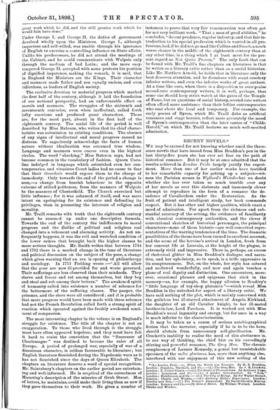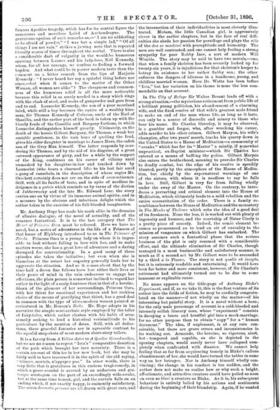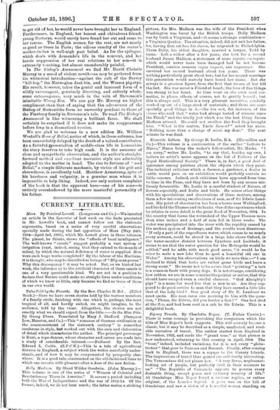RECENT NOVELS.*
WE may be excused for not knowing whether amid the three- score novels that have issued from Miss Braddon's pen in the last thirty-five years she has ever set foot on the path of historical romance. But it may be at once admitted that the results achieved in London Pride largely justify the experi- thent. More than one of her earlier works have testified to her remarkable capacity for getting up a subject—wit, ness the Parisian scenes in Wyllard's Weird—but we doubt. whether she has ever taken so much trouble over any of her novels as over this elaborate and immensely clever attempt to reproduce in the form of a romance the de- cadence of Cavalierdom under the Restoration. As the fruit of patient and intelligent study, her book commands respect. But it has other and higher qualities, which exact a meed of admiration. For apart from the richness and sub- stantial accuracy of the setting, the evidences of familiarity with classical contemporary authorities, and the clever if conventional sketches of historical personages, the principal characters—none of them historic—are well-conceived repre- sentatives of the warring tendencies of the time. The dramatic possibilities of the theme have been turned to excellent account, and the scene of the heroine's arrival in London, fresh from her convent life at Louvain, at the height of the plague, is extremely vivid and impressive. There is, perhaps, an excess of rhetorical glitter in Miss Braddon's dialogue and narra- tive, and her upholstery, so to speak, is a trifle oppressive in its sumptuousness. But, on the whole, her style has sobered and mellowed wonderfully, and now and again touches a plane of real dignity and distinction. One encounters, more- over, occasional phrases and epigrams that stick in the memory—as, for example, the happy allusion to Scudery's "little language of toy-shop platonics "—which reveal Miss Braddon in the unlocked-for aspect of a literary critic. We have said nothing of the plot, which is mainly concerned with the guileless but ill-starred attachment of Angela Kirkland, the daughter of an old Cavalier knight, to her ill-mated brother-in-law, Lord Fareham. It is worked out with Miss Braddon's usual ingenuity and energy, but for once in a way is much inferior to the characterisation.
It may be taken as a canon of serious autobiographical fiction that the narrator, especially if he is to be the hero, should abstain from unnecessary self-glorification. Mr. Crockett's inability to realise the need of this abstinence is, to our way of thinking, the chief blot on his exceedingly stirring and powerful romance, The Grey Man. The chronic complacency of Launce Kennedy, a genial but unmistakable specimen of the miles gloriosus, has, more than anything else, interfered with our enjoyment of this new setting of the • (1.) London Pride ; or' When the World was Younger. By M. E. Braddon. London : Simpkin, Marshall, and Co.—(2.) The (hey Man. By e. R. Crockett. London: T. Fisher Unvrin.—(3.) Tee Heart of Princess Oars. By Anthony Hope. London, Longmaue and Co.—(4.) A Quaker Grandmother. By "Iota" London Hutchinson and CO. —(5) The City of Refuge. By Sir Walter Besant. London: Matto and Windns.—(6.) Anthony Blake s Experiment. London : Bentley and Son.—(7 ) The Bishop's Amassment. By David Christie Murray. London : Downey and Co.—(8) Sans of Belied. By William Westall. London Matto and Windus.
famous Ayrshire tragedy, which has for its central figure the monstrous and merciless Laird of Auchendrayne. The gratuitous egotism of such remarks as,—" I am no nidderling to be afraid of powder," "I was but a simple lad," "Of all things I am not vain." strikes a jarring note that is repeated literally scores of times throughout the recital. There is also a considerable dash of vulgarity in the would-be humorous sparring between Launce and his lady-love, Nell Kennedy, whom, for all her courage, we confess to finding a forward hoyden. And what could be in poorer modern taste than the comment on a bitter remark from the lips of Marjorie Kennedy : I never heard her say a spiteful thing before nor since,—but when it comes to the matter of the Other Woman, all women are alike"? The cheapness and common- ness of the humorous relief is all the more noticeable because this relief is so sorely needed in a story which rings with the clash of steel, and reeks of gunpowder and gore from end to end. Launcelot Kennedy, the son of a poor moorland laird, while still a boy becomes the squire of a wealthy kins- man, Sir Thomas Kennedy of Culzean, uncle of the Earl of Classillis, and the earlier part of the book is taken up with the bloody feuds of the Cassillis and Bargany factions, in which Lanncelot distinguishes himself greatly. Ultimately, on the death of the heroic Gilbert Bargany, Sir Thomas, a weak but amiable gentleman, in the vain hope of quelling the fend, gives his elder daughter in marriage to James Mare, the oafish son of the Grey Man himself. The latter responds by mur- dering Sir Thomas, and by the aid of his disguise, of a great outward appearance of piety, and for a while by the support of the King, continues on his career of villainy until unmasked by his daughter-in-law and tracked down by Launcelot (who bears a charmed life) to his last lair amid a gang of cannibals, in the description of whose orgies Mr. Crockett certainly does not err on the side of over-reticence. Still, with all its faults of taste, and in spite of needless in- dulgence in a patois which reminds us by tarns of the diction of Jabberwocky and the late Mr. Edward Lear, the story carries one on by virtue of its immense animal spirits, and in a measure by the obvious and infectious delight which the author takes in the exercise of his fall-blooded imagination.
Mr. Anthony Hope has made his mark alike in the domains of allusive dialogue, of the novel of actuality, and of the romance fantastical. It is to the last category that The Heart of Princess Osra must be referred. Here we have no novel, but a series of adventures in the life of a Princess of that house of Elphberg introduced to us in The Prisoner of Zenda. Princess Osra is a young lady on whom it is impos- sible to look without falling in love with her, and to make matters worse, she has a great love of adventure and a daring disregard for conventionality. In a good many of these episodes she takes the initiative ; but even when she is blameless at the outset her coquetry generally leads her to aggravate the situation. And so it comes about that by the time half a dozen fine fellows have lost either their lives or their peace of mind in the vain endeavour to engage her affections, the plain person is somewhat inclined to regard her rather in the light of a scalp-huntress than in that of a heroine. Shorn of the glamour of her surroundings, Princess Osra, with her thirst for emotional experiences and her reckless choice of the means of gratifying that thirst, has a good deal in common with the type of ultra-modern woman painted or caricatured in Mr. Benson's Dodo. Mr. Hope adopts in his narrative the simple semi-archaic style employed by the teller of fairy-tales, which rather clashes with his habit of occa- sionally seeking to lend a historical verisimilitude to his portraiture by the mention of dates. Still, with all deduc- tions, these graceful fantasies are in agreeable contrast to the squalid snap-shots of most modern short-story tellers.
It is a far cry from A Yellow Aster to A Quaker Grandmother, but we see no reason to regret " Iota's " comparative desertion of the path which brought her into notoriety. There is a certain amount of thin ice in her new book, but she may be fairly said to have traversed it in the spirit of the old saying, " Glissez, toortels, n'appuyez pas." In other words, there is very little that is gratuitous in this curious tragi-comedy, in which a grave scandal is averted by an audacious and gro- tesque stratagem on the part of an exceedingly wide-awake, but at the same time honest, girl, and the curtain falls on an ending which, if not exactly happy, is eminently satisfactory. The seven dramatis person are all drawn with great care, and
the intersection of their individualities is most cleverly illus- trated. Miriam, the little Canadian girl, is aggressively clever in the earlier chapters, but in the face of real diffi- culties she sheds her passion for persiflage and plays the role of the dea ex machinei with promptitude and humanity. The men are well contrasted, and one cannot help feeling a strong sympathy for poor Robby Ice, a sort of modern Will Wimble. The story may be said to have two morals,—one, that when a family skeleton has been securely locked up for twenty-six years, it is injudicious for that skeleton's keeper to betray its existence to her rather flabby son; the other enforces the dangers of idleness in a handsome, young, and childless married woman. Here Dr. Watts has been before "Iota," but her variation on his theme is none the less com- mendable on that account.
In The City of Refuge Sir Walter Besant leads off with a strong situation,—the mysterious retirement from public life of a brilliant young politician, his abandonment of a charming wife, and the fixed resolve of that wife's greatest male friend to make an end of the man whose life, as long as it lasts, can only be a source of discredit and misery to those who bear his name. Sir Charles Osterley, it may be observed, is a gambler and forger, who, after wrecking his career, adds murder to his other crimes. Gilbert Maryon, his wife's champion, after two years' search, tracks his quarry down in the United States to a House of Meditation—a community of "cranks" which has for its "Master" a saintly. if-somewhat unpractical, ex-Baptist minister—which Sir %Arles has entered as a means of baffling the police. Gilbert Maryon also enters the brotherhood, meaning to provoke Sir Charles to deadly combat, but the edge of his resolve is speedily blunted, partly by the atmosphere of the House of Medita- tion, but chiefly by the supernatural warnings of one of the sisters, with whom it is needless to say he falls in love. Still, Gilbert is very far from falling wholly under the sway of the Master. On the contrary, he intro- duces a perturbing and critical element into the House of Meditation, which ultimately leads to a mild rebellion and the entire reconstitution of the order. There is a family re- semblance between the House of Meditation and the monastery in The Monks of Thelema which robs the idea of a good deal of its freshness. None the less, it is worked out with plenty of ingenuity and humour, and the courtship of Sister Cicely is a pretty piece of comedy. Indeed, the comic element be- comes so pronounced as to lend an air of unreality to the mission of vengeance on which Gilbert has embarked. The story assumes such a fantastical phase that the serious business of the plot is only resumed with a considerable effort, and the ultimate elimination of Sir Charles, though managed in a most businesslike and satisfactory manner, is much as if a second act by Mr. Gilbert were to be succeeded by a third d la Pinero. The story is not gualis ab incept°, but it is extremely readable and entertaining. It would have been far better and more consistent, however, if Sir Charles's retirement had ultimately turned out to be due to some innocent or explicable cause.
No name appears on the title-page of Anthony Blake's Experiment, and if, as we take it, this is the first venture of its author into the fields of fiction, he may be cordially congratu- lated on the manner—if not wholly on the matter—of his interesting but painful story. It is a novel without a hero ; for the only male personage of account is a cold-blooded and intensely selfish literary man, whose " experiment " consists in decoying a brave and trustful girl into a mock-marriage, for no other purpose than to obtain " copy " for a" human document." The idea, if unpleasant, is at any rate con- ceivable, but there are grave errors and inconsistencies in its working out. Armande, the heroine, so vigorous, alert, hot - tempered and capable, as she is depicted in the opening chapters, would surely never have collapsed com- pletely when confronted with disaster. We cannot help feeling that so far from acquiescing tamely in Blake's callous abandonment of her, she would have turned the tables in some way on her betrayer. Nor is Anthony himself wholly con- vincing; the change in his conduct is too sudden, and the author does not make us realise how or why such a bright, affectionate, and attractive creature could have palled so soon on even so blasé a creature as Blake. As it is, his subsequent behaviour is entirely belied by his actions and sentiments during the beginning of their friendship. Again, if he wanted
to get rid of her, he would never have brought her to England. Furthermore, in England, her honest and chivalrous friend, young Sartorys, would surely have found her out and come to her rescue. The English scenes, for the rest, are not nearly so good as those in Paris; the odious cruelty of the rector's mother-in-law is well-nigh past belief. As for the epilogue, which deals with Armande's life in the convent, and her heroic suppression of her real relations to her son—it is extremely touching, but almost nnendurably painful.
In The Bishop's Amazement we find Mr. David Christie Murray in a mood of violent revolt—as may be gathered from his whimsical introduction—against the cult of the Surrey "hill-top," the Norwegian dust-bin, and the Wessex pig-stye. His revolt, however, takes the genial and innocent form of a wildly extravagant, genuinely diverting, and entirely whole- some extravaganza, very much in the vein of Stevenson's inimitable Wrong Box. We can pay Mr. Murray no higher compliment than that of saying that the adventures of the Bishop of Stokestithe form no unworthy pendant to those of the Finsbury family in Stevenson's tale. To read The Bishop's Amazement is like witnessing a brilliant farce. We shall certainly be surprised if it does not make its reappearance before long in a dramatised version.
We are glad to welcome in a new edition Mr. William Weetalre Sons of Belial, notice of which, in these columns, has been unavoidably delayed by the death of a valued contributor. As a faithfuLtresentation of middle-class life in Lancashire the story desehes to take high rank. It is the outcome of close and sympathetic observation, and the author's straight- forward method and excellent narrative style are admirably adapted to the matter in hand. The rise to fortune of " owd Bella]," a simple illiterate mechanic, by virtue of his grit and shrewdness, is excellently told. Matthew Armstrong, spite of his hardness and vulgarity, is a genuine man whom it is impossible to help liking. Indeed, our only serious complaint of the book is that the apparent hero—one of his sons—is entirely overshadowed by the more masterful personality of his father.












































 Previous page
Previous page